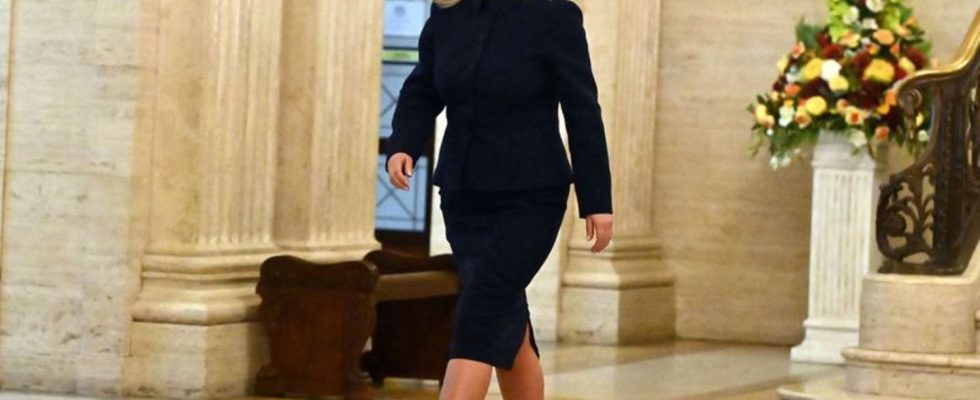Michelle O’Neill
First Catholic at the head of government in Northern Ireland
Michelle O’Neill in the Great Hall of Parliament House in Stormont (near Belfast). photo
© Oliver Mcveigh/PA Wire/dpa
After exactly two years to the day, Northern Ireland will have a government again. It is a drastic event for the British provinces.
Michelle O’Neill from the Sinn Fein party was elected as the new head of government in the regional parliament in Belfast on Saturday. She is the first Catholic to hold the office in the 103-year history of the British part of the country. The Irish television station RTÉ commented that it was a political earthquake.
This also ends the political crisis in Northern Ireland – exactly two years to the day after the collapse of the previous government. O’Neill’s Catholic-republican party Sinn Fein received the most votes for the first time in the most recent regional elections in May 2022 – but cannot freely choose its government partner.
Catholics and Protestants in government
Northern Ireland’s finely balanced political system requires that the sectarian camps work together to form a unity government. This is set out in the Good Friday Agreement, which ended the decades-long civil war in 1998 between Catholics seeking unification with Ireland and Protestants.
The largest Protestant party, the DUP, which advocates political union with Great Britain, is now entitled to the office of equal deputy head of government. Emma Little-Pengelly, a confidante of party leader Jeffrey Donaldson, was nominated for this.
“This is a parliament for everyone – Catholics, Protestants and dissidents,” O’Neill said in her first speech. “Despite our different views on the future constitutional situation, the public rightly demands that we work together, deliver results and work together.”
The DUP had refused to cooperate for two years. She ultimately called for an end to all customs controls between Northern Ireland and the rest of the United Kingdom, which the central government in London and the EU had agreed on after Brexit. Just a few days ago the DUP agreed to a new document.
Internal British controls should be reduced to a minimum – but experts call the agreement with the British central government symbolic. The Belfast Telegraph newspaper commented that the DUP had missed its target and was selling its defeat as a victory.
A chance for a united Ireland?
O’Neill’s inauguration is seen as a historic breakthrough for Irish nationalism. “Today opens the door to the future,” said the 47-year-old. Sinn Fein President Mary Lou McDonald had previously said that a united Ireland was “within reach”. According to surveys, the party that was once considered the political arm of the terrorist organization IRA is also the strongest force in the Republic of Ireland. There, however, two liberal-conservative parties in a coalition are preventing participation in the government.
In surveys, there has been great skepticism on the Northern Irish side so far. The Irish Times newspaper found at the end of 2023 that only 30 percent would be in favor of unification in a referendum, but 51 percent would be against it. In Ireland, approval is almost two thirds. In principle, the Irish leadership is also striving for a merger. “I believe there will be a united Ireland in my lifetime,” Prime Minister Leo Varadkar said in September – triggering sharp criticism from London.
The demographics favor Republicans. For the first time, there are more Catholics living in Northern Ireland than Protestants, a 2021 census has shown. As of now, it doesn’t look like this will change again. The area was founded in 1921 after the Irish Civil War expressly as a home for those who wanted to continue to be part of Great Britain – and the majority were Protestants.
Brexit and the consequences
The Unionists, who see themselves as British and not Irish, are now insisting on their positions all the more intensely, experts say. Militant loyalists also set buses on fire to protest against Brexit controls.
The aim of the previous regulation between Great Britain and the EU was to avoid a “hard border” between Northern Ireland and the EU member Ireland after Brexit in order not to stir up new conflicts. But the implementation sometimes led to shortages of food, medicine or garden products. Pets could no longer be taken on holiday to the UK. Loyalists feared that the controls would endanger the union with Great Britain.
Most parties in Northern Ireland welcomed the DUP’s return to “power sharing”. But hardcore unionists are not convinced. They criticize that Northern Ireland continues to be dependent on the laws of the EU, whose internal market the region is de facto part of even after Brexit. They also criticize the “enthronement” of O’Neill. “We have a Sinn Fein head of government, but not in my name or that of thousands of other unionists,” said Traditional Unionist Voice party leader Jim Allister.

